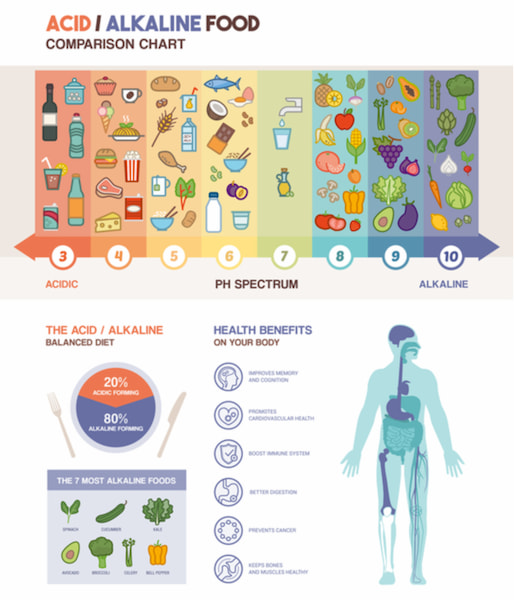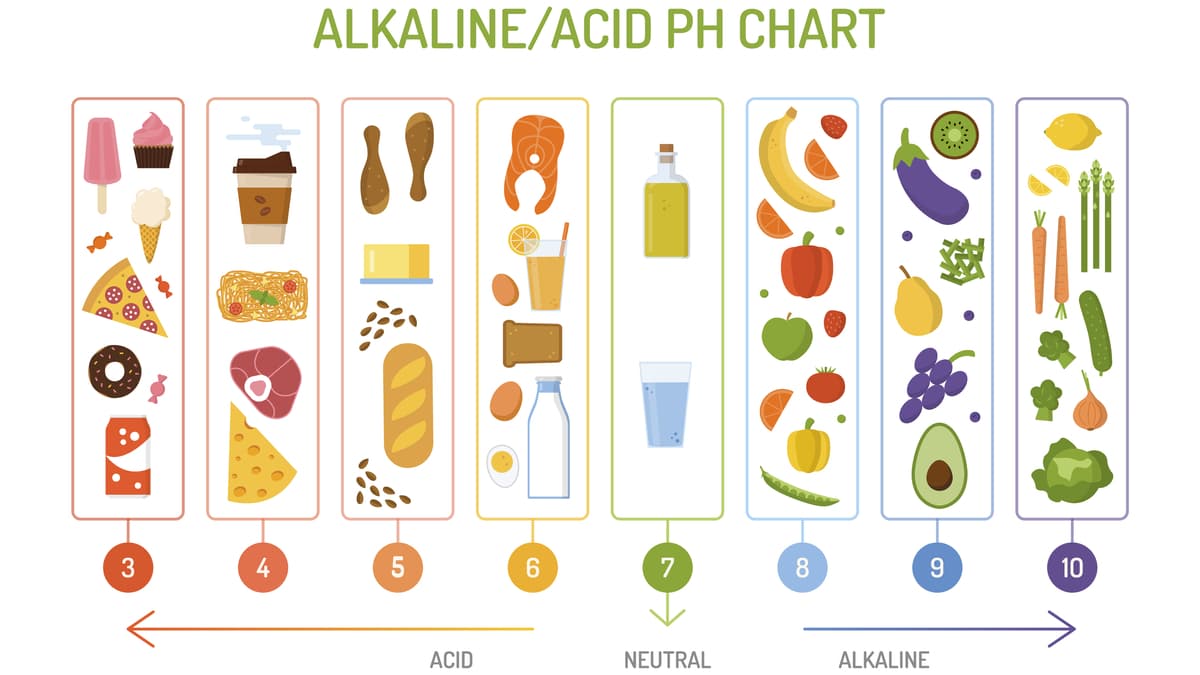The theory behind the alkaline diet is that diseases develop in an acidic environment (that is, with a low pH) and that; therefore, to prevent them, it is advisable to “alkalize” our body, that is, increase its pH. This alkaline diet maintains that we can achieve this through food. According to this theory, an alkaline pH in the body prevents diseases. According to the fundamentals of this diet, we can achieve this alkalization thanks to the diet that we carry out. For this reason, foods are distinguished according to those that are alkaline and those that are acidifying. In general, those following this method are committed to consuming a diet that includes 80% alkalizing foods and 20% neutral or slightly acidifying foods.
The human body has a surprising ability to maintain a constant pH balance in the blood through the main compensatory mechanisms: renal and respiratory. There are specific reasons why the pH of some parts of our body is not homogeneous. For example, the stomach’s pH ranges from 1.0 to 4.0, in the small intestine from 5.0 to 7.0, and in the large intestine, it is around 8.0. Maintaining these values positively influences cell homeostasis, as well as the absorption of nutrients and drugs. The excessive consumption of bicarbonate can alter the pH of the stomach, and this could cause a process of indigestion and nutritional deficiencies. As part of this complexity, urine can have a variable pH from acidic to alkaline, depending on the need to balance the body. Thus, it has been documented that alkaline diets result in a more alkaline urine pH and may reduce urine calcium. However, this may not reflect the total calcium balance due to other regulatory elements such as phosphate.
Benefits of the Alkaline Diet

- Stronger immune system. When the cellular soil is well nourished and clean, we do physical exercise regularly, and we follow good habits of mental and emotional hygiene, the immune system is strengthened, improving the body’s response to any possible disease.
- More energy and vitality. One of the most common causes of tiredness or fatigue by many people is the lack of alkalizing minerals, such as calcium or magnesium, responsible for generating micro-electricity at a cellular level. When we remineralize the body, among other things, an increase in electro-conductivity occurs, returning “the spark” and improving the energy level.
- It favors the natural purification of the body. One of the consequences of following an acidifying diet is the amount of waste generated after the digestive process. If we don’t do anything to prevent it, our elimination organs (which are responsible for filtering toxins) tend to become congested, and toxins begin to accumulate. The alkaline diet promotes and favors natural cleansing processes, helping to get rid of excess toxicity.
- Helps maintain our body weight. When there is excess toxicity, the body usually uses a preventive mechanism to isolate the acids from the blood, organs, and tissues: creating fat reserves to store the toxicity. A clean, toxin-free terrain will help avoid excess fatty tissue.
- Power our beauty. Alkaline food is rich in nutrients and, especially, in chlorophyll, which on the one hand favors the elimination of acids and, on the other, helps to optimize the oxygen level in the body, giving our skin a rosy and luminous appearance. In addition, our hair and nails are also strengthened since it improves the quality of cellular nutrition.
- Balance and emotional peace. The alkaline diet promotes the increase of plant foods and the reduction of foods of animal origin, especially processed meats. This diet change is also reflected on an emotional level, leaving us feeling more relaxed and calm.
- Improved sports performance. If we practice sports intensively and regularly, the alkaline diet will benefit us, especially because it is very cleansing and nutritious. On the one hand, this will help us eliminate the free radicals generated during the practice of sport due to the high level of oxidative stress, and on the other hand, to recover from the extra expenditure of resources and nutrients.
- Improves digestion. Green foods support the digestive process; since, in addition to providing us with digestive enzymes, they are also rich in fiber, essential for good intestinal transit.
- Helps increase cognitive performance. Hydration is the most important pillar on which alkaline nutrition lays its foundations; drinking quality water is essential to keep our brain in good shape. When the loss of body weight due to dehydration is more significant than 2%, the damage to cognitive function and motor control increases, which can speak already of the existence of a diminished mental function.
- Increase our libido. Among other things, being well nourished, practicing sports regularly, and having reserves of alkalizing mineral salts favors a healthy reproductive system and counteracts the effects of stress. In short, alkaline food and a healthy lifestyle benefit us in every way, improving our health and quality of life.
How to Follow this Diet?

The alkaline diet is based on the intake of potatoes, green vegetables, colored vegetables such as carrots and beets (but not tomatoes), corn, milk, cream, butter, bananas, almonds and Brazil nuts, chestnuts, dried fruits (apricots, dates, figs, prunes, raisins), alkaline mineral water, black olives, cold-pressed olive oil, avocado, whole sugar, sprouts, salt, algae, green spices. There is a third group, acid foods that can alkalize the internal environment according to individual metabolic characteristics: yogurt, kefir, lemon and citrus fruits, berries, sweet fruit (melon and watermelon), acidic vegetables (tomato, rhubarb, watercress, sorrel), sauerkraut, fruit and lemon juices, honey, vinegar.
Warnings
Like any diet, a doctor or health professional must supervise the alkaline diet to identify your nutritional level and perform it under their approval to obtain every one of its benefits. Depending on what your current state of health is, if you take medications or your pH levels are very raised or very low, a test is necessary to know how best to incorporate the alkaline and acidic foods that are suitable for you. An alkaline diet is not recommended for people with diabetes and kidney failure or any disease whose medication can affect or interact with the consumption of certain foods.

